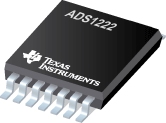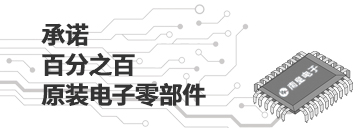

ADS1222是TI公司的一款精密ADC(<=10MSPS)产品,ADS1222是具有 2 通道差动输入多路复用器的 24 位 A/D 转换器,本页介绍了ADS1222的产品说明、应用、特性等,并给出了与ADS1222相关的TI元器件型号供参考。
ADS1222 - 具有 2 通道差动输入多路复用器的 24 位 A/D 转换器 - 精密ADC(<=10MSPS) - 模数转换器 - TI公司(Texas Instruments,德州仪器)
The ADS1222 is a 2-channel, 24-bit, delta-sigma analog-to-digital (A/D) converter. It offers excellent performance and low power in a TSSOP-14 package. The ADS1222 is well-suited for demanding, high-resolution measurements, especially in portable systems and other space-saving and power-constrained applications.
A delta-sigma (ΔΣ) modulator and digital filter form the basis of the A/D converter. The analog modulator has a ±5V differential input range. An input multiplexer (mux) is used to select between two separate differential input channels. A buffer can be selected to increase the input impedance of the measurement.
A simple, 2-wire serial interface provides all the necessary control. Data retrieval, self-calibration, and Standby mode are handled with a few simple waveforms. When only single conversions are needed, the ADS1222 can be quickly shut down (Standby mode) while idle between measurements to dramatically reduce the overall power consumption. Multiple ADS1222s can be connected together to create a synchronously sampling multichannel measurement system. The ADS1222 is designed to easily connect to microcontrollers, such as the MSP430.
The ADS1222 supports 2.7V to 5.5V supplies. Power is typically less than 1mW in 3V operation and less than 1µW during Standby mode.
- 240SPS Data Rate with 4MHz Clock
- 20-Bit Effective Resolution
- Input Multiplexer with Two Differential Channels
- Pin-Selectable, High-Impedance Input Buffer
- ±5V Differential Input Range
- 0.0003% INL (typ), 0.0015% INL (max)
- Self-Calibrating
- Simple 2-Wire Serial Interface
- On-Chip Temperature Sensor
- Single Conversions with Standby Mode
- Low Current Consumption: 300µA
- Analog Supply: 2.7V to 5.5V
- APPLICATIONS
- Hand-Held Instrumentation
- Portable Medical Equipment
- Industrial Process Control
- Weigh Scales
All trademarks are the property of their respective owners.







